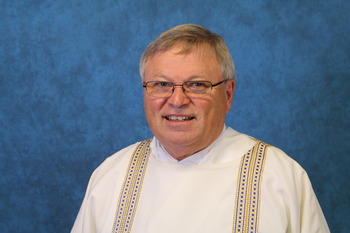The Mystery of Trinitarian Communion
-
October 23, 2025On the first day of our diaconate formation classes, Msgr. Schlesselmann wrote in big letters across the blackboard, “The Mystery of Trinitarian Communion.” After giving us a chance to look at what he wrote, he said, “Pay attention to what I have just written because this is what we will be studying for the next four years!”
I was surprised to read what Monsignor had written and to hear his emphasis on the importance of this mystery of our faith. I hadn’t up to that point in my life spent much time meditating on this great mystery, but after going through the diaconate formation program, I realized why the Mystery of Trinitarian Communion is the most important mystery of our faith.
All mysteries of our faith are infinite in depth, and as finite creatures we will never ever be able to plummet the complete depth of the mystery in our lifetime. We should however try to dive in as deeply as possible into this great mystery of Trinitarian Communion.
The Mystery of Trinitarian Communion is very important because it answers the three most vital questions of life.
Who is God?
Who am I?
What is my purpose?
In diving into this mystery we must get to know God, not just to know about him, but rather to know him as our friend and lover. God is not a solitary God but is rather a communion of three persons: the Father, the Son, and the Holy Spirit. These three persons are co-eternal and co-equal. They live in such unity that they are one and indivisible. They are a family with a bond of infinite love. Because the nature of love is to share love with others, God decided to create mankind to receive his love. He didn’t create us for any selfish need on his part, but rather created us to love and to be loved by him.
God created the first man and woman, Adam and Eve, in his own image and likeness and placed them on this earth for a time of testing to prove their love for him. Unfortunately, Adam and Eve failed their test of love for God by disobeying him. Their disobedience resulted in a wound to God who is infinite, and an infinite wound cannot be healed by someone who is finite.
Because of his infinite love for us, he became one of us to heal the wound created by Adam and Eve and to take on our human nature so we could unite with him. As stated in the Catechism of the Catholic Church: “God became man so that man could become God” (CCC 460).
By knowing God, we can come to know ourselves, as being created out of love for love in the image and likeness of God. We also get to know that God desires that we become his adopted sons and daughters and become a true member of his family of love with him in heaven forever.
Once we come to a knowledge of God as our Father who loves us with an infinite love and know that we are his beloved sons and daughters, we can then come to know our true purpose. We now can know that our purpose in life is to grow in love for God and for one another. We are to share this “good news” we have learned in knowing God and our true identity with others so they too can become a member of this eternal family of love.
Diving into the Mystery of Trinitarian Communion and getting to know God, to know our identity and to know our purpose results in an attitude of gratitude, thanks, joy, peace, and hope.
May God bless you in your journey into the Mystery of Trinitarian Communion.

